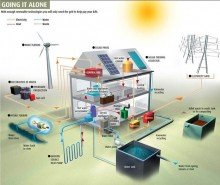As a rural county there’s no shortage of people in Dorset looking for a the “good life”. Dreams of self-sufficiency and bountiful vegetable plots abound, but in the modern day it’s increasingly hard to completely switch off from technology. Even if you’re not addicted to social media, you might want to check your bank account online or pay some bills with your smartphone. You can make a change about where this energy comes from though – by producing your own electricity through more sustainable and environmentally friendly methods than those offered by the national grid.
Why go off-grid?
There’s many reasons to make the switch to off-grid power, some of which may be more important to you than others.
-
Save money. While initial capital is required to install the relevant technology to generate your power, in the long term you will be looking at generous savings.
-
Free yourself from the control of energy companies and rising prices.
-
Be self-sufficient in blackouts or bad weather.
-
Benefit the environment by generating electricity through renewable and sustainable means, reducing your carbon footprint.
Getting started on the road to self-sufficiency
Some forward planning can be really valuable when thinking about going off-grid for your power needs. It’s also a good idea to get into an energy-conserving mindset, by switching off lights and unplugging appliances after use, and swapping your lightbulbs and appliances for more energy efficient options. Calculate your energy usage and looking at the options for generating power in your home. Dorset averages between 1500 and 2000 sunshine hours a year, so solar power is worth looking into – but also consider if hydroelectric power or biomass boilers are appropriate for some of your needs.
Practical changes
Working energy efficiency and power generation into a new house is sometimes easier than adding to an existing building, as the entire fabric and orientation of the house can be designed for maximum energy benefits. However, there are still many smaller projects which you can undertake on your current home, such as installing roof solar panels, and adding double glazing or shutters to help reduce heat loss.
Be sure to research thoroughly what you are allowed to do with your land and/or buildings. Planning laws in some areas of the county can be particularly tight if it is designated as a place of natural beauty or scientific interest. Also make sure to check out any government schemes to help with the cost of installing your off-grid renewable energy source.
It’s not necessarily a quick process, but for those who are dedicated and willing to put the effort in, off-grid living is an achievable and satisfying dream.
Jackie Edwards







